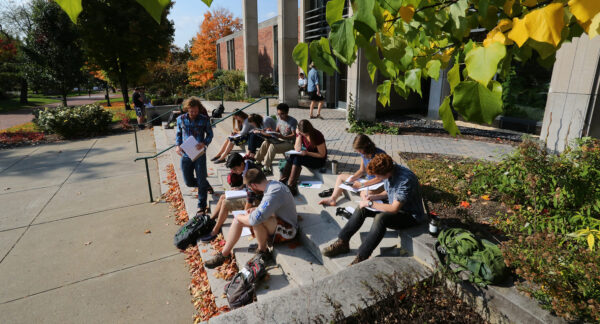
Environmental Writing
Explore the power of creative expression to inform others about the natural world and shape responses to the environmental challenges that face us today and in the future.
Why Minor in Environmental Writing at Allegheny College
As an Allegheny English—Environmental Writing student, you’ll explore how writers construct meaning and express the human experience. We’ll prepare you for your future by cultivating deep thinking, insightful analysis, and compelling expression.
Unusual Combinations
Students often combine Environmental Writing with:
Concentrations
- Creative writing
- Literature
Division
- Language, Literature, and Culture
Program Type
- Minor
Number of Credits
24 for minorCareers in Environmental Writing
A degree in Environmental Writing prepares you for jobs in industries such as:
- Writing/editing
- Education
- Publishing
- Advertising
- Public relations
- Business
Where Environmental Writing Alumni Work Today
Senior Research Associate
University of Idaho in the Department of Entomology, Plant Pathology, and Nematology
Paige Hickman ’17
Plastic Pollution Consultant
The World Bank
Zoie Diana ’14
Research Technician
Pennsylvania State University
Bella Petitta ’21
Landscape Designer
Nelson Byrd Woltz Landscape Architects
Jennifer Lauer ’12
Environmental Scientist
ARCADIS U.S.
J. Mark Burkhart ’14
Project Environmental Specialist
GAI Consultants, Inc.
Anna (Koebley) Findish ’14
Park Ranger
Allegheny County
Lindsey Waugaman ’14
Sustainability Coordinator
Reed College
Rachel Willis ’12
Life Scientist
US Environmental Protection Agency (EPA)
Michelle Woods ’18
Wildlife Specialist
USDA Animal and Plant Health Inspection Service (APHIS)
Cameron Eddy ’12
Executive Education Intern
Pittsburgh Parks Conservancy
Ivy Ryan ’19
Wolf Research Technician
Voyageurs Wolf Project
Maggie Baham ’23
Heritage GIS Technician
The Western Pennsylvania Conservancy
Megan Kresse ’22
Campaign Manager for Clean Water Advocacy
PennFuture
Jenny Tompkins ’18

View Adele’s StoryAllegheny is incredible for having the Civic Engagement department.

View Carolyn’s StoryThat brand new ‘Aquatic Environments’ major 50 years ago has grown into an amazing program!
Your Four-Year Journey
Year One: Understanding
You will take at least two courses outside the English Department that will deepen your understanding of the natural environment or of environmental issues. One course must come from the Environmental Science Department, and we strongly recommend ENVSC 110 – Introduction to Environmental Science.
Year Two: New Approaches
In your first and into your second year, you will study multiple genres of literary works concerning the environment and develop the ability to read carefully and understand the relationship between literary texts, the Environment, and a range of historical and/or literary contexts.
Year Three: Delving Deeper
Study the craft of fiction, poetry, or nonfiction through critical examination of both professional and student work. Explore areas within that genre and compose works that demonstrate an attention to ecology or environmental concerns.
Year Four: The Comp
Your focus on creative expression and revision in the Environmental Writing minor will undoubtedly be an asset as you write your Senior Comp in any subject!
Faculty and Staff
Professor
Ph.D., The University of Houston; M.F.A., Columbia University; B.A., University of Wisconsin, Madison
Email: cbakken@allegheny.edu
Phone: 814-332-4338
Email: ahart@allegheny.edu
Phone: 814-332-4875
Featured News

Allegheny College’s Michael Mehler Named One of 10 GLCA Academic Fellows in Arts and Humanities
Michael Mehler, Ph.D., Allegheny College professor of theatre and administrative chair of the Music Department, has been named an academic leadership fellow by the Great Lakes Colleges Association.








